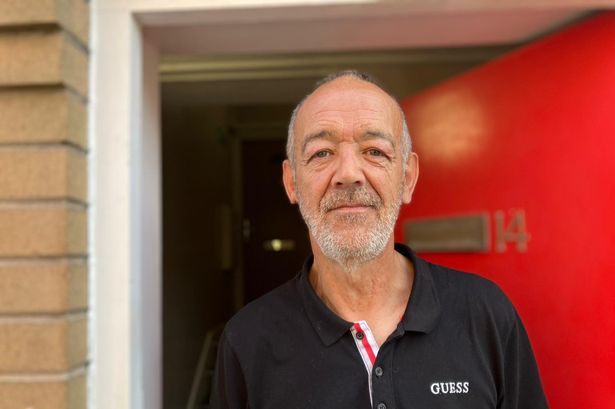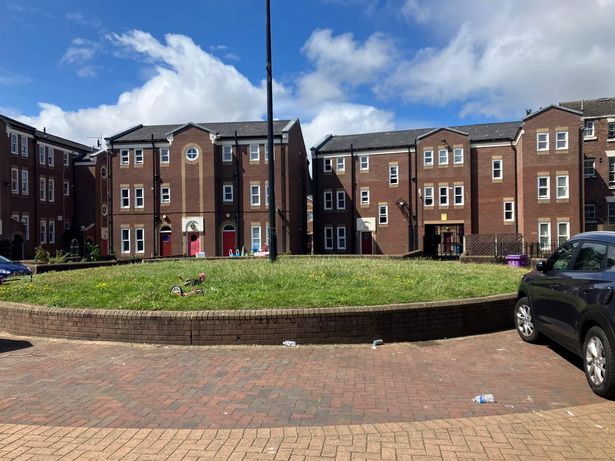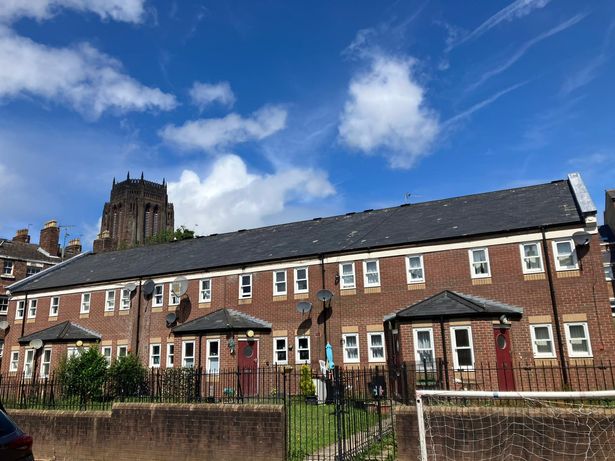Some residents are living in fear – while others say it’s ‘just nature’ Kieran Robertson, who lives in Mahon Court, is relaxed about the issue(Image: Liverpool Echo)
Kieran Robertson, who lives in Mahon Court, is relaxed about the issue(Image: Liverpool Echo)
People living in a Liverpool housing estate say they are “under attack” by massive seagulls plaguing their area. This week, ECHO has spoken to several residents of Mahon Court in the Georgian Quarter, a small, quiet square off Parliament Place with a few houses, several flats and a large elevated grass circle in the middle.
They say the white seabirds have hatched chicks on the roofs and tend to, in their words, “divebomb” into the square most days to protect the chicks in the elevated grass area in the middle of the square. However, some are more relaxed about the situation than others, believing it is simply nature taking its course.
Mahon Court is managed by Sanctuary Housing, one of the UK’s biggest social housing providers. The housing association declined to comment when contacted about the issue.
One unhappy resident, who did not wish to be named, contacted the ECHO this week: “It’s nesting season at the moment. Every day, they’re coming down.
“They’re attacking the dog, they’re attacking us. I’ve just been out with the dog just now and one of them just flew down and attacked us. They’re ripping the bins open and dragging the kids everywhere. It’s a hellhole.
“We call them XL Gullies. I’ve lived here for eight years. We’re terrified. They fly at you and come very low down, literally centimetres away from us.”
 Mahon Court in Liverpool, which has an issue with big seagulls
Mahon Court in Liverpool, which has an issue with big seagulls
When the ECHO visited the estate this week, we didn’t see any seagulls in the estate, Akbar Hhorbani, 60, said: “They go out and attack us when we leave the house. It’s scary. It happens all the time.”
Another resident said: “They divebomb at us. They’ve hatched chicks too.”
However, Kieran Robertson, 59, was more relaxed about the situation. He said: “It does happen but it’s just nature isn’t it? They’re only coming down to protect their little uns. They use their poo as dive bombs.
“It happened to me when I was out walking my dog this morning. I’ve told my neighbours to get a water bottle and make a small hole in the top of it to squirt at the seagulls.
“I tried to do that this morning but the bottle fell out of my hand. But I don’t see what Sanctuary could do.
“With rats, they’ve put down some poison. I don’t know what they could do with the seagulls. Once, I saw a few people here holding chicks. I told them about an animal sanctuary over the water which would take them in.”
 Mahon Court is located in the Georgian Quarter(Image: Liverpool Echo)
Mahon Court is located in the Georgian Quarter(Image: Liverpool Echo)
Another resident said: “I can see why people are scared but it’s not that big a deal. You do get seagulls here because they’re on the roof and have had chicks. I don’t see what Sanctuary could do. It’s just part of nature. You get them all around the place.”
As the ECHO has previously reported, the growth in the volume of litter, rubbish and discarded food items being dropped around the city centre is providing the perfect setting for the masses of super-seagulls we are now seeing.
Street cleaners have told us that the growing number of seagulls venturing further and further in land is both a symptom of the city’s problem – and a hindrance to their efforts as they rampage through discarded rubbish.
Waste Investigations Support and Enforcement (WISE) have been given a contract by Liverpool City Council to operate in all areas of the city.
The agreement means that there will be additional officers working to help prevent environmental crimes and issue Fixed Penalty Notices (FPNs) to anyone caught littering.
In England, littering, dog fouling and fly-tipping are all illegal. Anyone caught committing an offense can be issued a FPN by a local authority, or face prosecution in court.
As well as appointing an external enforcement team, Liverpool Council’s cabinet has also agreed to increase the rate of penalties to deter people from offending.
Litterers will now face a £150 penalty, while those caught dog fouling will be ordered to pay £100. A tiered penalty system has been introduced for fly-tipping, starting at £500, increasing depending on severity.
WISE will be supporting the work already taking place through the council’s internal environmental enforcement team, who have been in post since June last year.
Approximately £950,000 has been invested into the creation of the team, who, to date, have issued 151 FPNs and 183 written warnings, as well as speaking to almost 1000 residents and businesses about how to dispose of waste responsibly.
From 2023 to 2024, reports of fly-tipping dropped by 2.15 per cent, and requests to clean streets decreased by 21 per cent.
Despite the team’s work, the council has received 16,683 requests to remove fly-tipping in a 12-month period, costing taxpayers approximately £1.5m a year.
It is hoped that the number of reports will drop further after WISE start their patrols around the city. The organisation currently works with 31 local authorities and operates in cities such as Manchester, Birmingham, and Milton Keynes.
WISE and the city council will have regular meetings to review the service quality and mitigate any identified risks and the council says it will have have no targets for issuing FPNs for either its internal or external teams, with the focus instead on driving behaviour change across the city.
